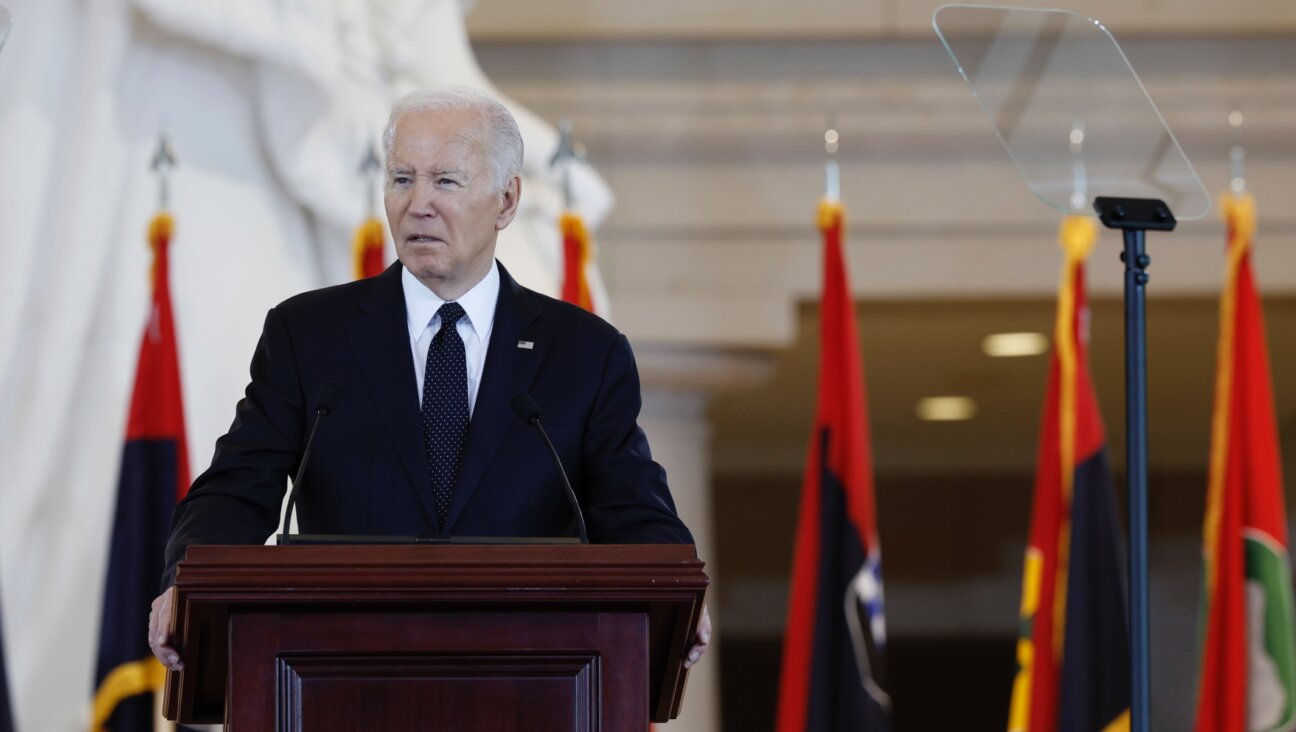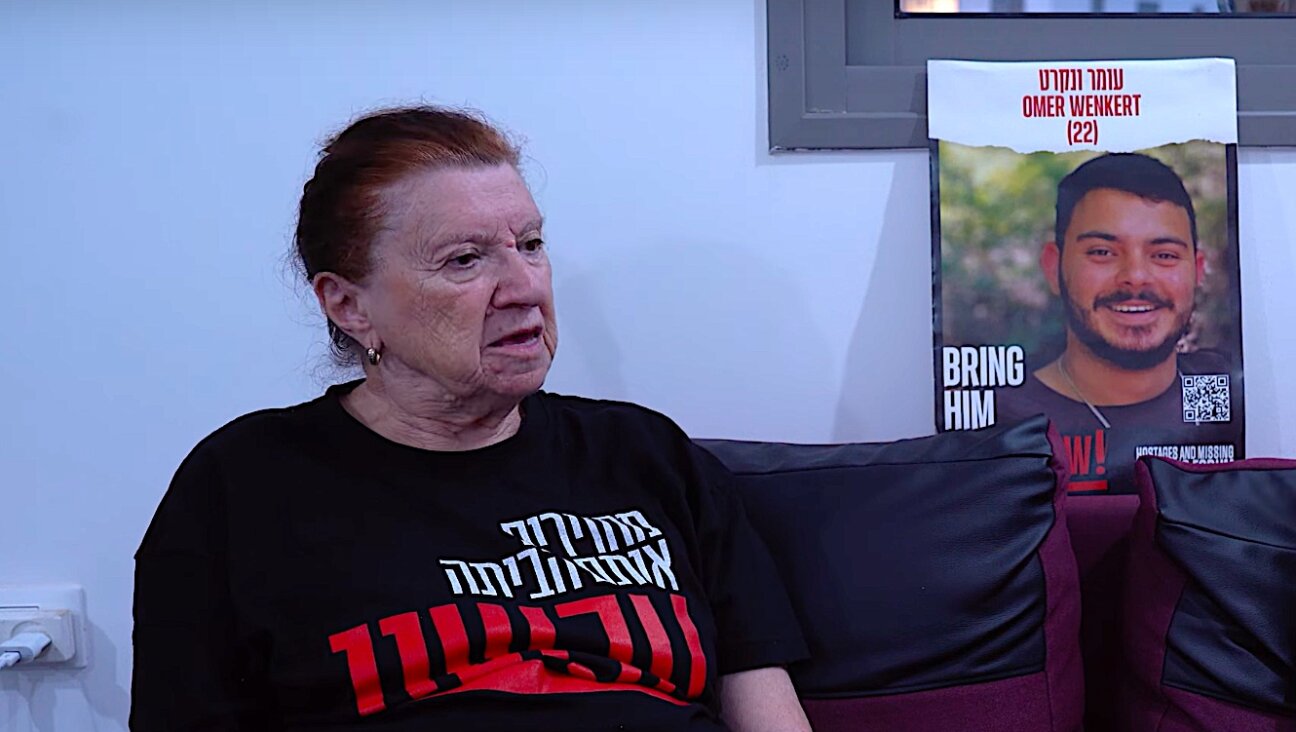Rabbis Barry Freundel and Leib Tropper Ensnared in Scandals Tied to Conversions

Rabbi Barry Freundel was charged with six counts of voyeurism amid allegations that he secretly recorded women showering in his synagogue’s mikvah.
A prominent Orthodox rabbi is disgraced, accused of sexual misconduct and inappropriate behavior towards converts.
That may sound like the scandal now toppling Barry Freundel, the prominent Washington, D.C. rabbi who pled not guilty on October 15 to allegations that he secretly videotaped women showering in the antechamber of his synagogue’s mikveh, or ritual bath.
Yet it also describes the 2009 downfall of Rabbi Leib Tropper, an ultra-Orthodox activist who resigned as head of an organization that advocated for stricter conversion standards after he was accused of setting up sexual encounters between a woman undergoing conversion and other men. Tropper was never charged.
When the Rabbinical Council of America — Modern Orthodoxy’s central rabbinic association — responded to the Tropper scandal in January 2010, it was Freundel, the head of the group’s conversion committee, who co-wrote its statement.
And, as was revealed only after Freundel’s arrest, the RCA discovered in 2012 that Freundel, like Tropper, was also coercing converts — albeit not sexually — but opted to keep him in his position as head of the committee on his promise to cease the practice.
Those are just two of the connections between the two scandals, which have surfaced four years apart. Both men are also on the stricter side of one of the most contentious debates in the Orthodox world: Who has the right to make someone Jewish?
Now, in the days after Freundel’s arrest, that debate has reignited. Israel’s government-sponsored Chief Rabbinate announced October 20 that it may not recognize conversions previously performed by Freundel, though the RCA has said it will. Meanwhile, the RCA says it’s taking another look at the strict, highly centralized conversion system that was the result of both men’s advocacy.
“These are the people who are posing as the gatekeepers of Judaism, and they themselves are so personally flawed morally,” said Rabbi Marc Angel, a longtime critic of the RCA’s push for stricter conversion standards, of Freundel and Tropper. “It’s just perplexing that these kind of people should have that kind of power.”
The Tropper scandal centered in Monsey, New York, an ultra-Orthodox enclave far from Freundel’s cosmopolitan Washington, D.C. congregation that includes beltway Jewish royalty like U.S. Treasury Secretary Jack Lew, former senator Joe Lieberman and Leon Wieseltier, The New Republic’s longtime culture and arts editor.
Prior to the increased rigor and centralization of conversions in American Orthodoxy that Tropper and Freundel helped bring about in 2008, conversion among Orthodox rabbis ran on something like the honor system. Beyond the ultra-Orthodox world, at least, American Orthodox rabbis by and large accepted the validity of a conversion overseen by another Orthodox rabbi.
It was Tropper’s intercession with the Israeli state Rabbinate that laid the groundwork for the change in Modern Orthodox conversion policies, known as Geirus Policy and Standards, or GPS, using the Hebrew word for conversion. Tropper, who is affiliated with the ultra-Orthodox stream of Judaism that is to the right of Modern Orthodoxy, wielded heavy influence with the Chief Rabbinate in 2005 and 2006, and was able to convince the Sephardic chief rabbi, Shlomo Amar, not to automatically recognize conversions performed by Modern Orthodox RCA rabbis.
This had serious consequences for Jews converted in America who moved to Israel, where there is no separation between religion and state in many areas of personal status. If their conversions were not recognized by the Israeli rabbinate, which oversees all Jewish marriages in Israel by law, American converts could not get married in the country. In Israel, there is no procedure for secular or non-Orthodox marriage.
In order to get the Israelis to respect the conversions they performed, the RCA created the GPS system, which designated a few rabbinic courts whose conversions the Israeli rabbinate was willing to recognize.
That infuriated rabbis like Angel, who valued the autonomy of individual rabbis to organize their own conversions. GPS was one of a handful of issues that caused Angel and others to split with the mainstream Modern Orthodox rabbinic association and create their own — the International Rabbinic Fellowship, which Angel co-founded with Rabbi Avi Weiss.
Freundel was on the other side of the argument. He was appointed head of the GPS committee upon its creation in 2006 and led it until 2013. It was under his tenure that the system was set up and that authorized rabbinic courts were identified or organized. When Tropper resigned in disgrace in 2009, Freundel used the scandal as an opportunity to boast of controls against abuse built into the GPS system. In an article co-authored with the then-president of the RCA, Rabbi Moshe Kletenik, Freundel wrote that the GPS system “prevents the kinds of problems associated with [Tropper’s group].”
Now, the RCA is taking a second look at GPS.
“We’re always willing to learn, and we’re always willing to make appropriate changes that are better for the conversion candidates, and for the system as a whole,” said Rabbi Mark Dratch, the RCA’s executive vice president. “Because these things happen all over the country, we’re not always as hands-on, and as a result, things can slip through the cracks, which is something that happened in Washington.”
The voyeurism charges against Freundel were accompanied, soon after his arrest, by allegations that Freundel had behaved inappropriately with conversion candidates. The Washington Post reported that one convert to Judaism claimed that Freundel had told her she could take “practice dunks” in the mikveh. And the RCA said in an October 20 press release that it had discovered in 2012 that Freundel had coerced conversion candidates to do clerical work at his home and make financial donations to his rabbinic court. The group had also found that he shared a checking account with a conversion candidate.
At the time, Freundel served as the head of the Washington, D.C. rabbinical court that oversaw conversions. The RCA did not remove him from the position, and he remained head of the GPS committee.
“Freundel made assurances that these behaviors would discontinue,” the RCA said in its statement. “A committee of rabbis and lay leaders determined that while Rabbi Freundel’s actions were inappropriate (and were a violation of his position) they did not rise to a level that required him to be suspended from the RCA or to be removed from his work with converts, as long as they did not continue.”
Days after Freundel’s arrest, the group announced it would create a commission to review the GPS system and “suggest safeguards against possible abuses.” The RCA will also appoint female ombudsmen to all of the rabbinic courts performing conversions under GPS. The RCA does not permit female members, and women do not serve on Modern Orthodox rabbinical courts. The new ombudsmen will “receive the concerns of female candidates to conversion,” the group’s statement read.
“By its very nature there is a power imbalance when it comes to conversion,” Dratch said. “A person comes, and his or her fate, future is in the hands of other people.”
Dratch defended GPS itself, saying that the oversight it provided, if flawed, was better than what preceded it. He said that the membership of the committee to review GPS had not been determined, but would bring in non-rabbis, including women.
“I think one of the positive things that may come from this is that we are going beyond ourselves for the input and advice and guidance of others,” Dratch said.
It’s not clear how the Israeli state rabbinate’s warning that it may not recognize Freundel’s conversions will affect the RCA’s process. A spokesperson for the Chief Rabbinate told Haaretz that the group would consider the situation of the converts in light of Jewish law and draft a policy. It’s not clear how many conversions could be questioned.
Correction: An earlier version of this story was unclear in its comparison of Tropper and Freundel. No charges were ever filed against Tropper.

I hope you appreciated this article. Before you go, I’d like to ask you to please support the Forward’s award-winning, nonprofit journalism during this critical time.
Now more than ever, American Jews need independent news they can trust, with reporting driven by truth, not ideology. We serve you, not any ideological agenda.
At a time when other newsrooms are closing or cutting back, the Forward has removed its paywall and invested additional resources to report on the ground from Israel and around the U.S. on the impact of the war, rising antisemitism and the protests on college campuses.
Readers like you make it all possible. Support our work by becoming a Forward Member and connect with our journalism and your community.
Make a gift of any size and become a Forward member today. You’ll support our mission to tell the American Jewish story fully and fairly.
— Rachel Fishman Feddersen, Publisher and CEO
Join our mission to tell the Jewish story fully and fairly.

























